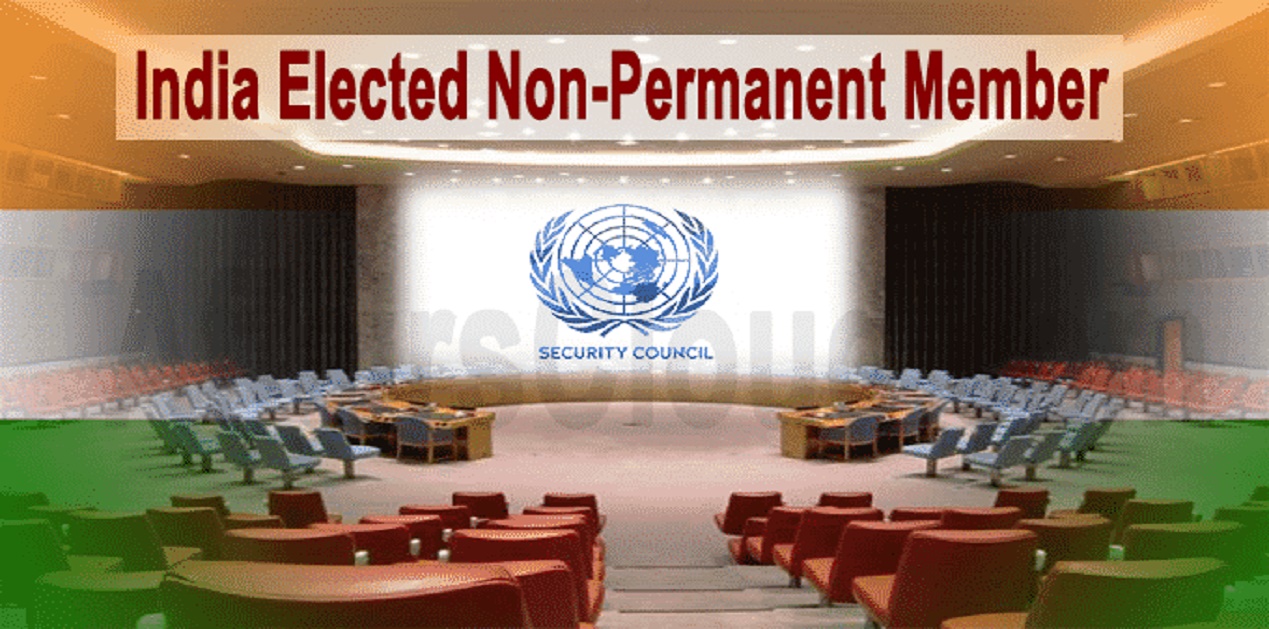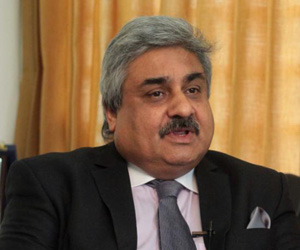On 17 June, India wascomfortably elected to the non- permanent seat of the United Nations Security Council (UNSC) for the period of two years starting January 2021, receiving the endorsement from 184 out of the 192 countries who voted. In its last bid for the UNSC seat in 2010, India has secured 187 votes. Each year the General Assembly elects five non – permanent members (out of 10 in total) for a two-year term. The 10 non-permanent seats are distributed on a regional basis – five for African and Asian states, one for Eastern European States, two for the Latin-American and Caribbean States, and two for Western European and other States. The 55 member Asia Pacific group had already endorsed India as the sole contender from the region in June 2019. The candidates though, require a 2/3 majority (128 votes) of the 193 UN General Assembly members to be elected. India will hold the non-permanent seat at the UNSC to coincide with the 75 the anniversary of independence in 2022. It will also be hosting the G – 20 meeting in New Delhi in that year.
Traditionally, the UNSC elections are held in the General Assembly hall with each of the 193 member states casting its vote in a secret ballot. Now, large gatherings and meetings at the UN headquarters have been postponed till the end of June due to Covid -19 pandemic. Under the new voting arrangements President of the General Assembly Tijjani Muhammad Bande circulated a letter to all member States 10 days working days prior to the first round of the secret balloting, informing them of the date on which the elections will be held, the number of vacant seats, the venue where ballots were to be cast and other logistical details. On the Election Day the voters were required to visit the designated venue during a specific time slot to cast the ballots. Only ballots cast in the ballot boxes at the designated venues were accepted and no ballots were accepted after the last time slot had expired.
The General Assembly President circulated a letter to all Member States informing them of the results once the voting was complete and the ballots counted. Ireland with 128 votes and Norway with 130 votes edged out Canada which secured 108 votes forthe two seats on offer in the Western Europe and other countries group. Mexico with 187 votes was the only candidate for the one Latin American and Caribbean seat. Neither Kenya with 113 votes and Djibouti with 78 votes, who were contesting the seat available for the African group could get past the 2/3 rd mark and will now contest the second round.
Unlike in the past, this term of India in the UN Security Council will present a number of challenges. Besides the 2011-12 term India was also a non – permanent member in 1950-51, 1967-68, 1972-73, 1977-78, 1984-85 and 1991-92. India has already stated that it will seek to address the challenges to internal governance of the UN system, and an effective and collective response of the world community to international terrorism. India has been known as a country with a voice of reason and a firm supporter of international law as well as multilateral institutions.
Speaking last month, Foreign Minister S. Jaishankar had said that India has plans for the ‘Five S” approach to the world while it is in the non – permanent UNSC seat – Samman (respect), Samvad (dialogue), Sahayog (cooperation), Shanti (peace), and Samriddhi (prosperity). Through this approach, he said, India wanted a“new orientation for a reformed multilateral system,” (NORMS). Multilateralism, he said, needed to reflect contemporary realities and adopt a comprehensive approach to peace and security and technology with a human touch, which in turn will be guided by dialogue, mutual respect and commitment to international law. Global institutions needed to be reformed and adequately represented, in order to be able to deliver. With its global values, and positive contribution, “to the security of the global commons”, India, he said,” will work constructively with partners to overcome old and new fault lines”. India’s Permanent Representative to the UN TS Tirumurti has said that India’s presence in the UN Security Council will help bring to the world its ethos of “Vasudhaiva Kutumbakam” – the world is one.
India has been at the forefront during many years of efforts to reform the Security Council, emphasizing all along that it rightly deserves a place as a permanent member of the Council which in its current form does not represent the geo political realities of the 21st century, and this reform is needed for it to remain effective and credible. There is a G-4 proposal on the table, in which India, along with Germany, Japan and Brazil have pressed their case as Permanent Members of the UNSecurity Council, even though it may be without a veto for some years. A larger proposal to expand the UN Security Council with two other members from Africa in addition to the G-4 did not come to fruition due to lack of consensus in the African group. All these proposals however, face alternate, challenging proposals and the informal discussion in the UN on this issue have not progressed due to vested interests of the Permanent 5 members, their proxies, and others who feel left out. India, as a player in all UN institutions, an active participant in UN peace keeping activities, a respected voice in the G 77 grouping and a member of the G-20 besides representing 1/6 th of humanity will need to push further on its case.
The UN is drifting towards ineffectiveness, due to lack of consensus among the Permanent -5 members, failure to come up with effective responses, usurping of powers through voluntary contributions in the absence of adequate finances by a set of countries, and domination of top positions by countries like China in many international organizations which it now uses for its own ends. However, India will have to work diligently within the confines of realities of the global situation. Issues like a global convention on terrorism, climate change, and the expansion and reform of the UN Security Council, all of which are close to India’s heart are issues on which there are many divisive voices which will need to be overcome diligently.
India’s presence in the UN Security Council will make it a tad easier to counter moves by China to target New Delhi on internal issues like reorganization of its own territory in that forum. China’s illegal actions in Ladakh and crossing into Indian territory on multiple points along the Line of Actual Control over the past few weeks, its aggressive posture in the South China Sea and scant disregard for rule of law, the aggression around the Senkakus, in the Taiwanese waters, and overflights on its territory, its actions concerning Hongong and Xinjiang will all come under spotlight, and have shown its real intentions. India can leverage these developments to push for its own deserving and qualified candidates to head UN organizations, and should endeavor to get elected to more Committees, as well as positions within the UN system.
(Ambassador Anil Wadhwa is for former Secretary (East) in the Ministry of External Affairs and currently a Distinguished Fellow with the Vivekananda International Foundation based in New Delhi.)
(The paper is the author’s individual scholastic articulation. The author certifies that the article/paper is original in content, unpublished and it has not been submitted for publication/web upload elsewhere, and that the facts and figures quoted are duly referenced, as needed, and are believed to be correct). (The paper does not necessarily represent the organisational stance... More >>
Image Source: https://affairscloud.com/assets/uploads/2020/06/India-elected-non-permanent-member.png










Post new comment